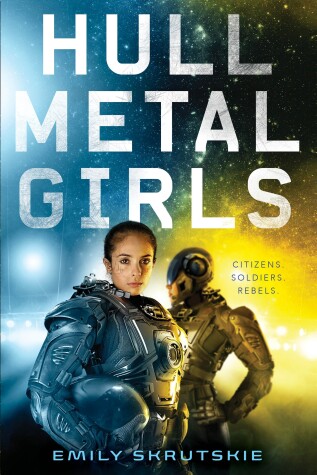"The Chancellor sees us the way humans do, the way I used to see Scela. We're tools. Weapons. Things to be wielded with force."Hullmetal Girls is an ambitious science fiction novel that brings together many elements into an interesting (and frightening) future. The book gripped me with its first words, providing just enough of a primer of the world, the customs, and I had high hopes for this Battlestar Galactica mashup with cyborgs and a militaristic dystopian future. Unfortunately, this book fell short for me and didn't live up to my hopes.
It's been three hundred and one years since humanity left the solar system and took to space in search of a new planet to call home. They live in a fleet of ships that are all under Commander Vel's command and searching for a home together. Due to rising tensions from the Fractionists that want to see the fleet split up into smaller groups to search, Vel has requested a large recruitment drive for people to volunteer to become Scela, cyborgs in the General Body that are the military force of the fleet.
Hullmetal Girls is told in the alternating perspectives of new Sclea recruits Aisha Un-Haad and Key Tanaka, but there are also two secondary characters that are part of their "unit": Woojin Lin and Praava.
--We are introduced to Aisha as she is going in for her procedure to be made into a Scela (what they call cyborgs) and serve in the General Body. We are present for the painful operation of her taking the metal. She is from the backend of the fleet, the poorer areas, and has chosen this to help her siblings.The characters all took to the metal for different reasons; however, we learn that Key doesn't remember those reasons or anything from her life before.
--We are introduced to Key as she wakes up from the procedure in recovery and discovers that she has no memory of her life prior to the operation. By her mannerisms and drive, she deduces that she is from the front of the fleet, privileged in ways that mean she wouldn't need to choose this life. Is she a true believer?
"Nothing left for me except my exo and this new purpose I found in the fragments of myself."Much of the story is consumed by the conversion to Scela and their training, and I was left wondering what the plot of the book actually was. While there were hints to the political situation and the potential conspiracies, for me they were mired down by the Scela conversion and training. I don't read a lot of science fiction with cyborgs so this may be something typical of the genre that isn't to my personal preferences. I found myself bored and skimming after about 40% of the book, and it wasn't until conspiracies arose and motives were questioned that I got back into the story a bit.
I like a dual-POV story, especially with characters like Aisha and Key that obviously are from different situations and backgrounds; however, at times their inner monologues were very repetitive, adding to the feelings I had that the book was drawn out longer than necessary. I also found the character motivations a little blurred at times, shifting without reason as it suited the narrative. There are a number of occasions where Aisha or Key's position on a subject made a complete 180 with hardly any convincing or acknowledgement that they had changed their mind.
There are many elements explored in this tale: religion (Ledic) versus... I assume atheism, as the Ledic disdain was clear but there was not contrast opinion or explanation of why it fell out of favor; utilitarianism (greater good) and gray morality; class systems and prejudices based on where in the fleet you were born. This book has a diverse cast of characters, and there are characters which identify as aroace and pansexual; however, it is important to note the sexuality discussion was all of two sentences.
This is an ambitious tale of power, loyalty, and family set in space. I personally found the cyborg aspects (the conversion and training) to be the least compelling and wish that part of the story had been a bit shorter. There were breadcrumbs dropped in the early pages that come in to play much later, but I found the exploration and intrigue of the latter 40% of the book to be the most interesting and wish that they had been fleshed out more. Hullmetal Girls has a lot of elements being explored - religion, class systems, utilitarianism - but for me those components were overshadowed by the Scela narrative and left me wanting more. At its core, this is a story about the extent the government and its opposers will go for "the greater good," and how people get swept up into something they didn't sign up for.
Thank you to NetGalley and the publisher, Random House Children's / Delacorte Press, for providing me an e-arc of this book in exchange for my honest review.
Blog | Twitter | Pinterest
